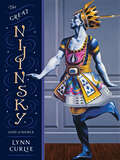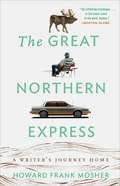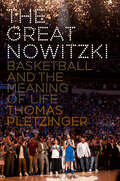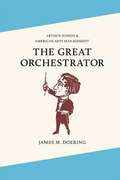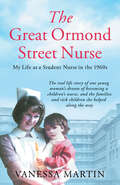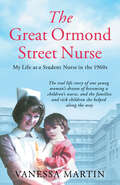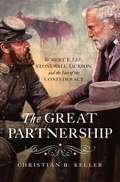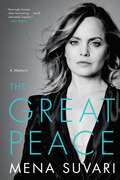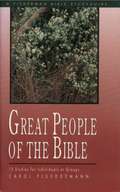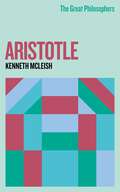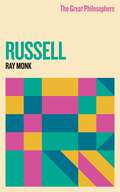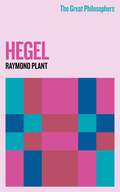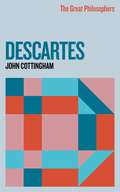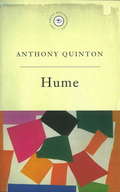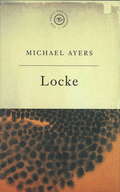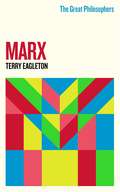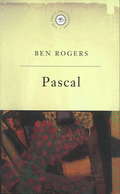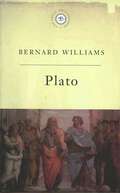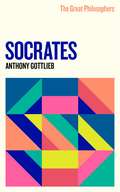- Table View
- List View
The Great Nijinsky: God of Dance
by Lynn CurleeA tragic story of a cultural icon—dance prodigy, sex symbol, LGBTQ+ pioneer—this compelling work of narrative nonfiction chronicles a life of obsessive artistry and celebrity of Vaslav Nijinsky. With one grand leap off the stage at the 1909 premiere of the Ballets Russes's inaugural season, Nijinsky became an overnight sensation and the century's first superstar, in the days before moving pictures brought popular culture to the masses. Perhaps the greatest dancer of the twentieth century, Nijinsky captured audiences with his sheer animal magnetism and incredible skill. He was also half of the most famous (and openly gay) couple of the Edwardian era: his relationship with Serge Diaghilev, artistic director and architect of the Ballets Russes, pushed boundaries in a time when homosexuality and bisexuality were rarely discussed. Nijinsky's life was tumultuous--after marrying a female groupie he hardly knew, he was kicked out of the Ballets Russes and placed under house arrest during World War I. Unable to work as he once did, his mental health deteriorated, and he spent three decades in and out of institutions.Biographical narrative is interspersed with spotlights on the ballets the dancer popularized: classic masterworks such as Afternoon of a Faun, The Firebird, and of course, the shockingly original Rite of Spring, which caused the audience to riot at its premiere. Illustrated with elegant, intimate portraits as well as archival art and photographs.
The Great Northern Express: A Writer's Journey Home
by Howard Frank MosherFrom bestselling, nationally celebrated author Howard Frank Mosher, a wildly funny and deeply personal account of his three-month, 20,000-mile sojourn to discover what he loved enough to live for. Several months before novelist Howard Frank Mosher turned sixty-five, he learned that he had prostate cancer. Following forty-six intensive radiation treatments, Mosher set out alone in his twenty-year-old Chevy Celebrity on a monumental road trip and book tour across twenty-first-century America. From a chance meeting with an angry moose in northern New England to late-night walks on the wildest sides of America's largest cities, The Great Northern Express chronicles Mosher's escapades with an astonishing array of erudite bibliophiles, homeless hitchhikers, country crooners and strippers, and aspiring writers of all circumstances. Full of high and low comedy and rollicking adventures, this is part travel memoir, part autobiography, and pure, anarchic fun. From coast to coast and border to border, this unforgettable adventure of a top-notch American writer demonstrates that, sometimes, in order to know who we truly are, we must turn the wheel towards home.
The Great Nowitzki: Basketball and the Meaning of Life
by Thomas PletzingerA journey into the mindset of a historic basketball superstar, and the importance of his landmark career. The seven-foot Dirk Nowitzki is one of the greatest players in basketball history. The Dallas Maverick’s legend revolutionized the sport, redefining the role of the big man in the modern game. Dirk moved differently: flexible and fast, confident and in control. He thought differently, too. On the court, his shots were masterful—none more venerated than his signature one-legged flamingo fadeaway, a move that lives on in the repertoire of today’s most skilled NBA players. How did this lanky kid from the German suburbs become an all-time top ten scorer and NBA champion? How can a superstar stay so humble? Award-winning novelist and sportswriter Thomas Pletzinger spent over seven years traveling with Nowitzki. He witnessed Dirk’s summer workouts, involving fingertip pushups and the study of the physics, and spent days discussing literature and philosophy with Holger Geschwindner, Dirk’s enigmatic mentor and coach. Watching Nowitzki in empty gyms and in packed arenas with 30,000 fans, Pletzinger began to understand how Dirk and Holger’s philosophical insights on performance, creativity, and freedom enabled his success and longevity. The Great Nowitzki tells Dirk’s dramatic story like never before. Pletzinger describes Dirk’s youth in small-town Germany, follows the steep learning curve of Dirk’s early seasons, the devastating Finals loss to the Miami Heat, and the triumphant championship five years later. Traveling with Dirk in his final seasons, Pletzinger immerses himself in the community of people impacted by Nowitzki’s game, interviewing everyone from average fans in Dallas and security guards at the arena to front office executives and Hall of Fame teammates, who reflect on what Dirk’s career means to the next generation of ballplayers. And to the game itself. A masterpiece of sports writing that reads like a novel, The Great Nowitzki brims with a fan’s passion. Pletzinger shows how strongly basketball influences our imagination and the extraordinary journey an icon like Dirk Nowitzki must take to reach the pinnacle of the game.
The Great Orchestrator: Arthur Judson and American Arts Management (Music in American Life)
by James M. DoeringThis biography charts the career and legacy of the pioneering American music manager Arthur Judson (1881-1975), who rose to prominence in Philadelphia and New York at the beginning of the twentieth century. A violinist by training, Judson became manager of the Philadelphia Orchestra in 1915 under the iconic conductor Leopold Stokowski. Within a few years, Judson also took on management of the New York Philharmonic, navigating a period of change and the tenures of several important conductors who included William Mengelberg, Arturo Toscanini, and John Barbirolli. Judson also began managing individual artists, including pianists Alfred Cortot and Vladimir Horowitz, violinist Jasha Heifetz, and cellist Gregor Piatigorsky. He also organized the U.S. tours of several prominent composers, including Igor Stravinsky and Vincent d'Indy. At the same time, Judson began managing conductors. His first clients were Stokowski and Fritz Reiner. By the 1930s, Judson's conductor list included most of the important conductors working in America. Drawing on rich correspondence between Judson and the conductors and artists he served, James M. Doering demonstrates Judson's multifaceted roles, including involvement with programming choices, building audiences, negotiating with orchestra members and their unions, and exploring new technologies for extending the orchestras' reach. In addition to his colorful career behind the scenes at two preeminent American orchestras, Judson was important for a number of innovations in arts management. In 1922, he founded a nationwide network of local managers and later became involved in the relatively unexplored medium of radio, working first with WEAF in New York City and then later forming his own national radio network in 1927. Providing valuable insight into the workings of these orchestras and the formative years of arts management, The Great Orchestrator is a valuable portrait of one of the most powerful managers in American musical history.
The Great Ormond Street Hospital Nurse: My Life As A Student Nurse In The 1960s
by Vanessa Martin“You must learn to hold in your feelings,” Matron said, firmly but not unkindly. “One day it will be your duty to support the family and other staff through this tragedy. You need to be strong.” From the first time Vanessa Martin sets foot inside the world’s most renowned children’s hospital, she knows that she will never have another dull moment. From her first confrontation with the legendary matron, to consoling hordes of worried parents and caring for the wonderful bundles of joy themselves, Vanessa enters a world full of laughter, heartache and, most importantly, hard work. In this heartwarming memoir of a passionate, determined young woman trying to help as many children as she can, Vanessa pulls back the curtain on the bustling world of 60s London, and tells the remarkable story of finding her place within it. Nostalgic, charming and full of heart, The Great Ormond Street Nurse is the heroic tale of a woman who has dedicated over 40 years to the NHS.
Great Ormond Street Hospital Nurse: The life of a trainee nurse at GOSH in the 1960s
by Vanessa Martin"You must learn to hold in your feelings," Matron said, firmly but not unkindly. "One day it will be your duty to support the family and other staff through this tragedy. You need to be strong." From the first time Vanessa Martin sets foot inside the world's most renowned children's hospital, she knows that she will never have another dull moment. From her first confrontation with the legendary matron, to consoling hordes of worried parents and caring for the wonderful bundles of joy themselves, Vanessa enters a world full of laughter, heartache and, most importantly, hard work.In this heartwarming memoir of a passionate, determined young woman trying to help as many children as she can, Vanessa pulls back the curtain on the bustling world of 60s London, and tells the remarkable story of finding her place within it.Nostalgic, charming and full of heart, The Great Ormond Street Nurse is the heroic tale of a woman who has dedicated over 40 years to the NHS.
The Great Ormond Street Hospital Nurse: My Life As A Student Nurse In The 1960s
by Vanessa Martin“You must learn to hold in your feelings,” Matron said, firmly but not unkindly. “One day it will be your duty to support the family and other staff through this tragedy. You need to be strong.” From the first time Vanessa Martin sets foot inside the world’s most renowned children’s hospital, she knows that she will never have another dull moment. From her first confrontation with the legendary matron, to consoling hordes of worried parents and caring for the wonderful bundles of joy themselves, Vanessa enters a world full of laughter, heartache and, most importantly, hard work. In this heartwarming memoir of a passionate, determined young woman trying to help as many children as she can, Vanessa pulls back the curtain on the bustling world of 60s London, and tells the remarkable story of finding her place within it. Nostalgic, charming and full of heart, The Great Ormond Street Nurse is the heroic tale of a woman who has dedicated over 40 years to the NHS.
Great Ormond Street Hospital Nurse: The life of a trainee nurse at GOSH in the 1960s
by Vanessa Martin"You must learn to hold in your feelings," Matron said, firmly but not unkindly. "One day it will be your duty to support the family and other staff through this tragedy. You need to be strong." From the first time Vanessa Martin sets foot inside the world's most renowned children's hospital, she knows that she will never have another dull moment. From her first confrontation with the legendary matron, to consoling hordes of worried parents and caring for the wonderful bundles of joy themselves, Vanessa enters a world full of laughter, heartache and, most importantly, hard work.In this heartwarming memoir of a passionate, determined young woman trying to help as many children as she can, Vanessa pulls back the curtain on the bustling world of 60s London, and tells the remarkable story of finding her place within it.Nostalgic, charming and full of heart, The Great Ormond Street Nurse is the heroic tale of a woman who has dedicated over 40 years to the NHS.
The Great Partnership: Robert E. Lee, Stonewall Jackson, And The Fate Of The Confederacy
by Christian B. KellerThe story of the unique relationship between Lee and Jackson, two leaders who chiseled a strategic path forward against the odds and almost triumphed. Why were Generals Lee and Jackson so successful in their partner- ship in trying to win the war for the South? What was it about their styles, friendship, even their faith, that cemented them together into a fighting machine that consistently won despite often overwhelming odds against them? The Great Partnership has the power to change how we think about Confederate strategic decision-making and the value of personal relationships among senior leaders responsible for organizational survival. Those relationships in the Confederate high command were particularly critical for victory, especially the one that existed between the two great Army of Northern Virginia generals. It has been over two decades since any author attempted a joint study of the two generals. At the very least, the book will inspire a very lively debate among the thousands of students of Civil War his- tory. At best, it will significantly revise how we evaluate Confederate strategy during the height the war and our understanding of why, in the end, the South lost.
The Great Peace: A Memoir
by Mena SuvariA memoir by award-winning actor Mena Suvari, best-known forher iconic roles in American Beauty, American Pie, and Six Feet Under.The Great Peace is a harrowing, heartbreaking coming-of-age story set in Hollywood, in which young teenage model-turned-actor Mena Suvari lost herself to sex, drugs and bad, often abusive relationships even as blockbuster movies made her famous. It's about growing up in the 90s, with a soundtrack ranging from The Doors to Deee-Lite, fashion from denim to day-glo, and a woman dealing with the lasting psychological scars of abuse, yet knowing deep inside she desires so much more from life.Within these vulnerable pages, Mena not only reveals her own mistakes, but also the lessons she learned and her efforts to understand and grow rather than casting blame. As such, she makes this a timeless story of girl empowerment and redemption, of somebody using their voice to rediscover their past, seek redemption, and to understand their mistakes, and ultimately come to terms with their power as an individual to find a way and a will to live—and thrive. Poignant, intimate, and powerful, this book will resonate with anyone who has found themselves lost in the darkness, thinking there's no way out. Ultimately, Mena's story proves that, no matter how hopeless it may seem, there's always a light at the end.
Great Peacemakers: True Stories from Around the World
by Ken Beller Heather ChaseIt is said that the choices we make determine the lives we lead. In this book you will meet twenty inspiring individuals who have made peace their choice in life--from a Vietnamese monk to a Brazilian musician, from a Swedish children's author to an Iranian-American architect. Exploring a wide range of approaches to peacemaking, Great Peacemakers is organized into five paths to peace: choosing nonviolence, living peace, honoring diversity, valuing all life, and caring for the planet. Each path showcases the true life stories of four amazing peacemakers who have successfully cultivated peace in a variety of ways. As a whole, the book strives for an overall balance of race, nationality, religion, gender, age, and level of fame. Whether you are a parent seeking positive roles models for your children, an educator looking for thought-provoking material for your students, or someone simply wanting an uplifting read, then Great Peacemakers is sure to meet your needs and inspire the peacemaker in you. Great Peacemakers won the 2007 International Peace Writing Award from the Peace and Justice Studies Association and the OMNI Center for Peace, Justice, and Ecology. The book is also endorsed by three heads of state and three Nobel Peace Prize recipients, including Dr. Oscar Arias, president of Costa Rica and Nobel Laureate, who said: "Powerful, well-researched and, above all, timely, Great Peacemakers should be required reading for the youth of the world."
Great People of the Bible: 15 Studies for Individuals or Groups (Fisherman Bible Studyguide Series)
by Carol PlueddemannThe great people highlighted in this study give encouragement and hope for lives today because Christians have the same resource they had--faith in a great God.
The Great Philosophers: Aristotle
by Kenneth McleishAristotle c. 384- c.322 BCThe ideas Aristotle outlined in his Poetics have formed the foundation for the whole history of western critical theory. No work has had more influence upon the literature of centuries - neither has any been so profoundly, so perversely misunderstood.Mystification, moralization, recruitment into the cause of this or that literary culture... with all the interpretations, Aristotle has too seldom been permitted to speak for himself. If the prescriptive rigidities of the Renaissance went entirely against the grain of his open, accepting empiricism, the psychologising mania of the moderns has been no truer a reflection of his thought.Kenneth McLeish's introduction cuts through centuries of accreted obscurity to reveal the forthright, astonishingly original book which Aristotle actually wrote. The philosopher who emerges proves more 'modern' than any of his interpreters.
The Great Philosophers: Russell
by Ray MonkBertrand Russell 1872-1970Bertrand Russell discovered mathematics at the age of eleven. It was, he recalled, a transporting experience: 'as dazzling as first love.'From that moment on, he would pursue his passion with undying devotion and all but erotic fervour. Mathematics might succeed, he felt, where philosophy had failed, reducing thought to its purest form, and freeing knowledge from doubt and contradiction.And so, for a time, it seemed. Russell's mathematical investigations effortlessly resolved at a stroke some of philosophy's most intractable problems. Yet if mathematics could be a liberating mistress, she was an unreliable one...Opening up the work of one of our age's undisputed giants, Ray Monk's exhilaratingly clear, readable guide tells a compelling human tale too: a moving story of love and loss, of ecstatic triumph and deep disillusion.
The Great Philosophers: Hegel
by Raymond PlantPart of the GREAT PHILOSOPHERS series.G.W.F. Hegel 1770-1831Without Hegel, modern thought is unthinkable. From Marx to Merleau-Pontyh, from Kierkegaard to Nietzsche, those whose ideas have made the modern age have all worked in his shadow.For Hegel's preoccupations have turned out to be our own. The isolation of the individual adrift in society, the yearning of the divided self for an integrated wholeness: these are anxieties his successors have shared. The rival claims of the personal and the public, the immediate instant and the wider historic narrative: these have remained pressing problems through two hundred years of change.Yet if his 'philosophy' seems as contemporary as ever, Hegel's 'religious' views have been dismissed as irrelevant anachronism. The distinction is false, however. In his theological explorations, suggests Raymond Plant in this illuminating new guide, Hegel tackled the issues of interest to us all.
The Great Philosophers:Aristotle (GREAT PHILOSOPHERS)
by Kenneth McleishAristotle c. 384- c.322 BCThe ideas Aristotle outlined in his Poetics have formed the foundation for the whole history of western critical theory. No work has had more influence upon the literature of centuries - neither has any been so profoundly, so perversely misunderstood.Mystification, moralization, recruitment into the cause of this or that literary culture... with all the interpretations, Aristotle has too seldom been permitted to speak for himself. If the prescriptive rigidities of the Renaissance went entirely against the grain of his open, accepting empiricism, the psychologising mania of the moderns has been no truer a reflection of his thought.Kenneth McLeish's introduction cuts through centuries of accreted obscurity to reveal the forthright, astonishingly original book which Aristotle actually wrote. The philosopher who emerges proves more 'modern' than any of his interpreters.
The Great Philosophers: Descartes
by John CottinghamRené Descartes 1596-1650The 'father of modern philosophy', René Descartes has been accorded all the admiration a father customarily receives - and all the resentment.That mind-body duality by which he so deftly made sense of us now seems less paradigm than prison. And yet, to unthink it appears impossible. For better of worse, Descartes must remain our starting-point in the attempt to understand ourselves and our relation to our world.Yet if the problems begin with Descartes, so too may some of the solutions. John Cottingham's fascinating guide finds in the French philosopher's own neglected later work some intriguing hints as to how the stumbling-blocks might be surmounted. The father of modern philosophy, it seems, might yet be his child's deliverer.
The Great Philosophers: Hegel (GREAT PHILOSOPHERS)
by Raymond PlantPart of the GREAT PHILOSOPHERS series.G.W.F. Hegel 1770-1831Without Hegel, modern thought is unthinkable. From Marx to Merleau-Pontyh, from Kierkegaard to Nietzsche, those whose ideas have made the modern age have all worked in his shadow.For Hegel's preoccupations have turned out to be our own. The isolation of the individual adrift in society, the yearning of the divided self for an integrated wholeness: these are anxieties his successors have shared. The rival claims of the personal and the public, the immediate instant and the wider historic narrative: these have remained pressing problems through two hundred years of change.Yet if his 'philosophy' seems as contemporary as ever, Hegel's 'religious' views have been dismissed as irrelevant anachronism. The distinction is false, however. In his theological explorations, suggests Raymond Plant in this illuminating new guide, Hegel tackled the issues of interest to us all.
The Great Philosophers: Hume
by Anthony QuintonA short book combining extracts from the work of one of the world's greatest thinkers with commentary by one of Britain's most distinguished writers on philosophy.
The Great Philosophers: Locke (GREAT PHILOSOPHERS)
by Michael AyresPart of the GREAT PHILOSOPHERS series.John Locke 1632-1704What Newton did for physics in the seventeenth century, Locke did for philosophy. The revolution wrought by these two giants established the intellectual underpinnings of the modern world.Yet out own age has called their contributions into question. While Newton's universe has come to seem unduly mechanistic, Locke has been out of favour for his wordy rhetoric, the apparent imprecision of his thought and the perceived irrelevance of his once-radical empiricism.This fascinating guide restores an underrated thinker to his rightful place at the very centre of modern philosophical enquiry. Basing his exposition upon a resourceful re-reading of An Essay concerning Human Understanding, Michael Ayers explains the historical significance of Locke's philosophical project, and its continuing capacity to challenge and compel.
The Great Philosophers:Marx
by Terry Eagleton'We are free when, like artists, we produce without the goad of physical necessity' Karl MarxFor Marx, freedom entailed release from commercial labour. In this highly engaging account, Eagleton outlines the relationship between production, labour and ownership which lie at the core of Marx's thinking. Marx's utopia was a place in which labour is increasingly automated, emancipating the wealth of sensuous individual development so that 'savouring a peach [is an aspect] of our self-actualisation as much as building dams or churning out coat-hangers'. Combining extracts from Marx's revolutionary philosophy, along with insightful analysis, this is the perfect guide to one of the world's greatest thinkers.
The Great Philosophers:Pascal (GREAT PHILOSOPHERS)
by Ben RogersPascal 1623-1662The moralist who advocated dressing up, the ascetic who liked a flutter, the devout Christian who lauded vanity, Pascal is a funnier, more ironic philosopher than his reputation as an anguished existentialist would suggest.Yet however irreverent the terms of his ironic project, its underlying impetus is both serious and profound. In this superb new introduction to the thinker and his thought, Ben Rogers demonstrates the deep wisdom of Pascal's defence of popular folly - a defence which he used to highlight the higher delusions of the learned.Setting the Pensées in the context of Pascal's life and philosophical career, Rogers reveals how their apparent frivolity underpins a fascinating, far-reaching and still challenging body of moral and political thought. His remarkable guide offers an eye-opening account of the work of a marvellous and much neglected thinker.
The Great Philosophers: Plato (GREAT PHILOSOPHERS)
by Professor Bernard WilliamsPlato c428 - c348BCWithout the work of Plato, western thought is, quite literally, unthinkable. No single influence has been greater, in every age and in every philosophic field. Even those thinkers who have rejected Plato's views have found themselves working to an agenda he set.Yet between the neo-platonist interpretations and the anti-platonist reactions, the stuff of 'Platonism' proper has often been obscured. The philosopher himself has not necessarily helped in the matter: at times disconcertingly difficult, at other disarmingly simple, Plato can be an elusive thinker, his meanings hard to pin down. His dialogues complex and often ironically constructed and do not simply expand his views, which in any case changed and developed over a long life.In this lucid and exciting new introductory guide, Bernard Williams takes his reader back to first principles, re-reading the key texts to reveal what the philosopher actually said. The result is a rediscovered Plato: often unexpected, always fascinating and rewarding.
The Great Philosophers: Russell (GREAT PHILOSOPHERS)
by Ray MonkBertrand Russell 1872-1970Bertrand Russell discovered mathematics at the age of eleven. It was, he recalled, a transporting experience: 'as dazzling as first love.'From that moment on, he would pursue his passion with undying devotion and all but erotic fervour. Mathematics might succeed, he felt, where philosophy had failed, reducing thought to its purest form, and freeing knowledge from doubt and contradiction.And so, for a time, it seemed. Russell's mathematical investigations effortlessly resolved at a stroke some of philosophy's most intractable problems. Yet if mathematics could be a liberating mistress, she was an unreliable one...Opening up the work of one of our age's undisputed giants, Ray Monk's exhilaratingly clear, readable guide tells a compelling human tale too: a moving story of love and loss, of ecstatic triumph and deep disillusion.
The Great Philosophers: Socrates (GREAT PHILOSOPHERS)
by Anthony Gottlieb'If you put me to death,' Socrates warned his Athenian judges, 'you will not easily find anyone to take my place.' So indeed it would prove, a single cup of hemlock robbing the western philosophical tradition of the man with best claims to be its founding father.Yet Socrates' influence was not so easily to be done away with. His words lovingly recorded by his devoted disciple Plato, his doctrines reached a posterity which has, through twenty-seven centuries now, taken him as its teacher.The marriage of idealism and scepticism in his though; his sense of education as self-discovery; his view of philosophy as preparation for life: these have been the stuff of western thought at its best. So completely did Socrates embody these values, he was prepared to die in their defence...
